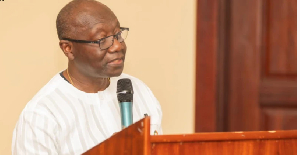The Oxford Business Group (OBG) says the Ghana’s economy remains comparatively competitive.
According to the ‘Ghana Report 2016,’ which captured the telecommunications, banking, oil, mining, tourism sectors of the economy, among others, the Ghanaian economy had suffered significant shocks in recent times.
Managing Editor for Africa, OBG, Robert Tashima released the report on Wednesday at the Tang Palace Hotel in Accra at the ‘Ghana Oxford Business Group: Five Years In Retrospect’ roundtable discussion.
He said the shocks, including depreciation, high trade deficit resulting from fiscal indiscipline and Dumsor (erratic power supply) which he termed as the “3Ds” of Ghana, have negatively affected the growth of Ghana’s economy in recent times.
That, he said, had led to the loss of several jobs and the collapse of companies, leading to a sharp fall in Ghana’s ranking on the global economic front.
He insisted that the discovery of oil in the country “has not yielded the fruits expected.”
But in spite of the above-mentioned challenges, Mr. Tashima said the Ghanaian economy still had some comparative advantages.
He said that the current challenges need to be tackled head-on to enable the country gain meaningfully from its competitiveness in the coming years.
According to him, the country’s continuous competitiveness was due in part to the good reputation it had built for itself democratically over the years, as well as its abundant natural resources.
He said “the outlook for Ghana is positive, with increased trade through the Tema Port and healthy exports of gold and cocoa expected to support long-term growth.
“While its fiscal position remains an issue, Ghana is now firmly established as a regional oil producer,” he said.
He added that “we look forward to documenting what’s next for the country as it embarks on the next phase of its development.
‘Gov’t Admits Challenges’
Deputy Minister of Trade and Industry, Ibrahim Murtala Mohammed, admitted the challenges highlighted in the report and stressed the need for Ghanaians to patronize made-in-Ghana goods to help address some of the problems.
Chief Executive Officer (CEO) of Ghana Investment Promotion Centre (GIPC), Mawuena Trebarh, in a statement, pointed out that competition for Foreign Direct Investment (FDI) had intensified.
She said Ghana was positioning itself to be the best FDI destination on the African continent.
CEO of Strategic Communications Africa, Esther Cobbah said there was the need for an increase in investments in the agriculture sector if government wants to improve the livelihoods of Ghanaians, especially women.
About OBG
Oxford Business Group is a global publishing, research and consultancy firm specializing in economic intelligence in the Middle East, Africa, Asia and Latin America.
OBG publishes 38 annual reports in about 34 countries across four continents.
The Ghana Report was published in partnership with the Ghana Investment Promotion Centre, Liberty Capital and Deloitte Ghana.
Business News of Thursday, 16 June 2016
Source: dailyguideafrica.com













